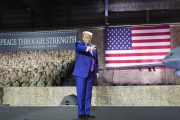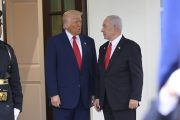
Top diplomats from the United States and China held their first meeting since the change in the U.S. administration in Anchorage, Alaska, on March 18-19. Even before the summit started, both sides signaled disagreement — they could not decide whether the exchange was a “strategic dialogue,” a reference to regular talks that fell apart under President Donald Trump, or something else.
“This is not a strategic dialogue,” U.S. Secretary of State Antony Blinken told members of Congress, contradicting Beijing’s own description of the event. “There’s no intent at this point for a series of follow-on engagements.” Chinese foreign ministry spokesman Zhao Lijian later released a response to Blinken’s remarks, describing the meetings as a “high-level strategic dialogue” being held “at the invitation of the U.S.”
To clarify his intentions, Blinken also told Congress that Washington would be mostly laying down demands on China at the summit. Only evidence of “tangible progress” by China would lead to more talks, he said. Or, as a senior administration official said in a briefing, “We don’t want them to be operating under illusions about our tough-minded approach to their very problematic behavior.”
The dominating position that the U.S. side tried to take during the summit mirrored overwhelming public support for a tough stance toward China on human rights and economic issues.
During the opening remarks, Blinken said (according to the transcript), “We’ll also discuss our deep concerns with actions by China, including in Xinjiang, Hong Kong, Taiwan, cyberattacks on the United States and economic coercion toward our allies. Each of these actions threaten the rules-based order that maintains global stability. That’s why they’re not merely internal matters and why we feel an obligation to raise these issues here today.”
U.S. National Security Advisor Jake Sullivan remarked that “a confident country is able to look hard at its own shortcomings and constantly seek to improve,” and expressed hope in a fruitful cooperation between the United States and China.
The Chinese, however, had their own agenda and were eager to retaliate. Chinese Communist Party foreign affairs chief Yang Jiechi’s speech was a cold shower after Sullivan’s optimistic remarks: “So let me say here that… the United States does not have the qualification to say that it wants to speak to China from a position of strength. The U.S. side was not even qualified to say such things even 20 years or 30 years back, because this is not the way to deal with the Chinese people.” Then Yang hit out at the United States for using its military power and financial supremacy to suppress other countries. “It abuses so-called notions of national security to obstruct normal trade exchanges, and incite some countries to attack China,” he said.
Yang further condemned the United States for interfering in its internal matters while asking Washington to reflect on its own failure to deal with internal human rights issues. He said that black Americans were being “slaughtered” there, referring to the killing of black Americans by police, and mentioned the Black Lives Matter movement in America.
Yang also pressed the U.S. side on the cyberattacks, noting that whether it’s the ability to launch cyberattacks or the technologies that could be deployed, the United States is the champion in this regard. “You can’t blame this problem on somebody else,” he added.
Another issue raised by the Chinese was the U.S. interference in China’s internal affairs. “We have expressed our staunch opposition to such interference, and we will take firm actions in response,” Yang warned in a condescending speech that went beyond 15 minutes in a blatant violation of protocol.
Chinese state councilor Wang Yi then continued to press the topic, and noted that the Chinese people were “outraged” by “the gross interference” in China’s internal affairs by the United States, referring to the extended sanctions under the Hong Kong Autonomy Act (passed last June under the Trump administration). On March 17, on the eve of the summit, the U.S. State Department officially added 24 Chinese and Hong Kong lawmakers, including a member of the Communist Party’s ruling Politburo, to the blacklist.
While much of Biden’s China policy is still being formulated, including how to handle the tariffs on Chinese goods implemented under Trump, his administration has so far placed a stronger emphasis on democratic values and allegations of human rights abuses by China.
According to Michael McCaul, the senior Republican on the House Foreign Affairs Committee, Yang’s conduct showed China had no plans to change its ways. “Their belligerence and false accusations should serve as a wake-up call to the Biden administration about exactly who they are dealing with,” he said.
Peter Navarro, President Trump’s former assistant and director of trade and manufacturing, said that the Chinese “ripped the faces off Sullivan and Blinken,” and Biden should have pulled them back immediately. Joe Biden, however, stated that he was proud of Antony Blinken.





